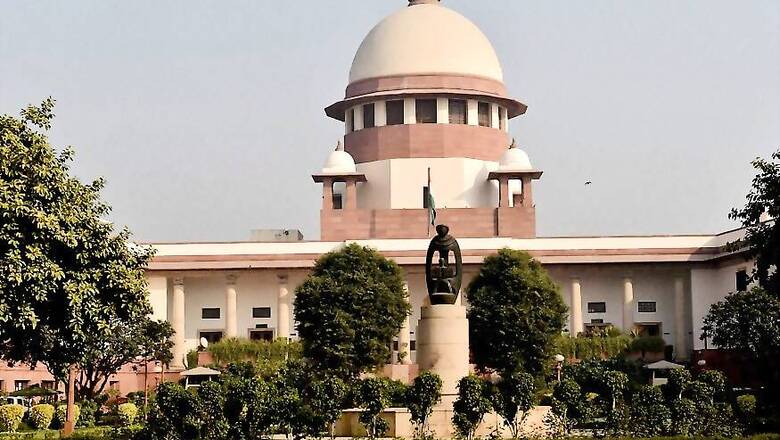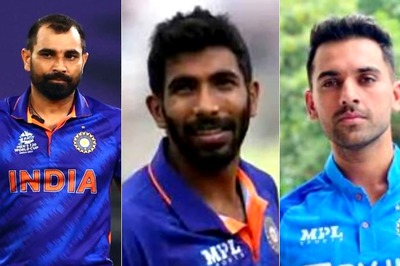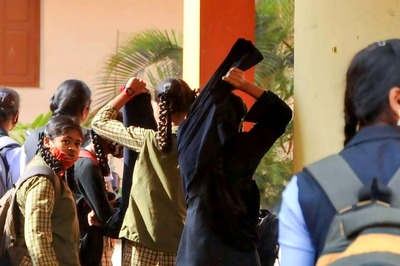
views
New Delhi: The Supreme Court on Thursday termed right to privacy as a “very complex issue” and wondered if a person could assert his right to remain anonymous and suppress his identity as facets of his privacy.
During the day-long hearing, the nine-judge bench deliberated upon the legislative and regulatory framework that may be required to be put in place by the Central government if the apex court were to assign to privacy the status of a fundamental right.
Right to privacy is being debated after questions arose whether collection of biometric data and its usage under Aadhaar scheme was a breach of people’s right to privacy, and if the privacy was a fundamental right.
On the second day of the Constitution bench hearing, the judges, including Justices Rohinton F Nariman, D Y Chandrachud and Sanjay K Kaul, told lawyers seeking a declaration in favour of right to privacy that one of the immediate consequences of declaring privacy a fundamental right could be creation of a corresponding obligation on the government to bring in a regulatory framework.
“The State will have to put in place a legislative and regulatory framework. But questions would arise about how one can enforce this right vis-à-vis private players since fundamental rights are enforceable against the State,” the bench asked the lawyers.
The lawyers responded that damages could be sought from the private parties whereas an individual would be able to approach a constitutional court against a State action if his right to privacy is impinged upon by a government or its agencies.
Justice Kaul, however, retorted that damages alone might not be the remedy when the right is given the status of being a fundamental right and some form of injunction even against the private players could be mulled.
The bench further wondered if right to privacy could be so pervasive that a person would be allowed to remain anonymous. “Can an individual assert his right to be anonymous? A fundamental question before us is about to what extent an individual can say that he has a right to remain anonymous. To what extent you can assert your right to privacy to suppress your identity,” asked Justice Chandrachud.
The judge illustrate this by saying whether a man can say that I want a passport but I would not furnish details of my parents or spouse in the form prescribed. “How far a citizen can say I will remain anonymous, especially when the State conducts census, surveys etc and collate all information,” he asked.
Justice Chandrachud then went on to discuss the “legitimate and illegitimate” use of data as he emphasized that data collection may by itself be not an example of breach in privacy. “Suppose the government collects data on convicted persons. Can it be wrong? We don’t think so. However, some countries use this meta data to profile its population in order to get an indication of people who are likely to commit crimes. Now this profiling based on artificial intelligence could be a breach,” he said.
Thus, the real difference, Justice Chandrachud said, was not about collection of data but the legitimate or illegitimate use of it. “If this data is used for providing social benefits to a HIV positive person, there is nothing wrong with it but if it is used to stigmatise that person, it falls foul of the rights,” said the judge. He added that although most of the information about individuals were usually in the public domain, the issue was “very complex” when somebody sought to assert this right in a particular manner.
Justice J Chelameswar asked senior lawyers Gopal Subramanium, Arvind Datar, Anand Grover and Sajan Poovayya if it would not be appropriate for the nine-judge bench to outline the boundaries of right to privacy. “Should we not acknowledge and identify the developments that have taken place in last few decades and say these are the identified facets of privacy?” asked the judge.
The lawyers, on their part, said that it would be more proper if the bench did not define the contours of this right and decide its delineation on a case to case basis. “There cannot be an exhaustive catalogue of this right and therefore it would be more proper if its contours are decided as and when situations arise, by also building upon the jurisprudence on privacy developed with passage of time,” submitted the lawyers.
Datar added there were different kinds of privacy. “Physical privacy is about protection against tangible or intangible invasion of one’s private space. Informational privacy is about an individual’s control over dissemination of his personal information and decisional privacy is about protection of a person’s autonomy over fundamental personal choices,” he said.
Poovayya highlighted significance of privacy in the digital era and said that the protection to this right was imperative at a time when we have 118 crore mobile connections and 40 crore internet connection in the country. “Secrecy is not the basis of privacy. Dignity is,” he said.
The senior lawyer also responded to the court’s queries regarding the process of data collection, saying the very thought of sharing of private information and about the government may be watching were enough to cause a chilling effect on free speech and actions. “Collection of data itself is problematic without a just reasonable law. My right begins at the stage of collection of data. The question to be asked is not to whether this data will be leaked or not, the question is how this data collection can be allowed without checks and balances,” he added.
Poovayya concluded his arguments by stating: “What this bench should consider is that if there was a judgment on this issue by the Supreme Court 15 years ago, could the government collect this data by an executive order through private agencies, thereby making it capable of being mined for various unwarranted purposes too.”
The court will resume the hearing on Tuesday next week when Attorney General K K Venugopal would commence his arguments on behalf of the Centre.




















Comments
0 comment